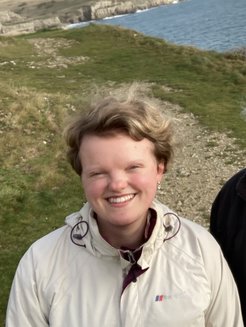Wissenschaftlerinnen am Institut
Am 8. März begehen die Vereinten Nationen den Internationalen Frauentag. Das Max-Planck-Institut feiert diesen Tag, indem es Forscherinnen und ihre Arbeit in den Mittelpunkt stellt.
Ka My Dang (PostDoc NINT)

1. What is your motivation for your research?
My motivation is to develop a brain-on-chip system that mimics brain activities and study neuronal connections.
2. What do you love about working at the Institute?
Working in an international environment is the most thing I like in the Institute. I have opportunities to learn different cultures and cuisine from my colleagues.
3. What is your talent or special skill next to your research?
I play badminton and chess in my free time.
Annika Johansson (Group leader, Minerva Fast Track, NISE)

1. What is your motivation for your research?
I like being part of a big scientific community. I hope to contribute some small steps to a common goal: to understand the world better.
2. What do you love about working at the Institute?
I have the opportunity to work with great scientist from different disciplines. The working environment is motivating and inspiring.
3. What is your talent or special skill next to your research?
I love music, play the piano and the cello, and used to be a member of the Academic Orchestra of the Martin Luther University.
Zihan Yin (Ph.D. NISE)

1. What is your motivation for your research?
I would like to explore something new and wish to make some changes, albeit insignificant, in this field.
2. What do you love about working at the Institute?
The institute provides a fantastic environment for us to make our ideas into practice and people here are very nice.
3. What is your talent or special skill next to your research?
Next to my research, I am also interested in music.
Emily McFarlane (Ph.D. SchröterLab, NISE)

1. What is your motivation for your research?
I am inspired by the collaborative efforts of scientists and researchers all around the world. Scientists working together to solve the big scientific problems of our age from climate change to the COVID-19 pandemic motivates me in my own research.
2. What do you love about working at the Institute?
I love working in such an international and diverse scientific environment. The atmosphere here is great, as everyone is working on new and exciting science.
3. 3. What is your talent or special skill next to your research?
Alongside my research, I also play the viola, and crochet.
Xin Mu (Ph.D. NINT)

1. What is your motivation for your research?
My motivation for the research is to explore more exciting facts about the photonics world.
2. What do you love about working at the Institute?
I really enjoy working at our institute, especically for the great colleagues, advanced experimental facilities, harmonious atmosphere and high flexibility.
3. What is your talent or special skill next to your research?
Always be curious, modest and diligent.
Ankita Sharma (Ph.D. NINT)

1. What is your motivation for your research?
I am motivated to apply my education to lead cutting-edge research in both industrial and academic settings, so I can create technological solutions that will shape the world around me. I believe that integrated photonics is a powerful technology for present-day challenges. Early in my undergraduate studies, I attended a seminar, which emphasized the inevitable end to Moore’s Law and the resulting future of device fabrication. Moore’s Law has underpinned the digital transformation in our society for the past half-century. Since that lecture, developing new solutions using integrated photonics to transfer information has fascinated me.
2. What do you love about working at the Institute?
The work for my doctorate degree is carried out at the University of Toronto and the Max Planck Institute as my supervisor is both a Professor at University of Toronto and a Director at the Max Planck Institute. I love that I am able to learn from some of the best in the scientific community in my research field and gain a unique international experience.
3. What is your talent or special skill next to your research?
I have chosen to dedicate the remainder of my available time to the cause of supporting young women in STEM because it is inherent to my own personal achievements. My level of involvement in STEM activities is a result of the ability to cultivate my own passion at a young age. In a single year I was able to teach 80 middle school girls and 25 boys at 12 workshops for robotics and programming . For these efforts I was selected as the recipient of the 2018 Robogals Outstanding Volunteer Award (USA). Through mentorship activities I am enthusiastic to educate the next generation of engineers. I hope that I can continue to build the infrastructure so that all boys and girls can have the opportunity to experience some form of engineering during their elementary school education.

















